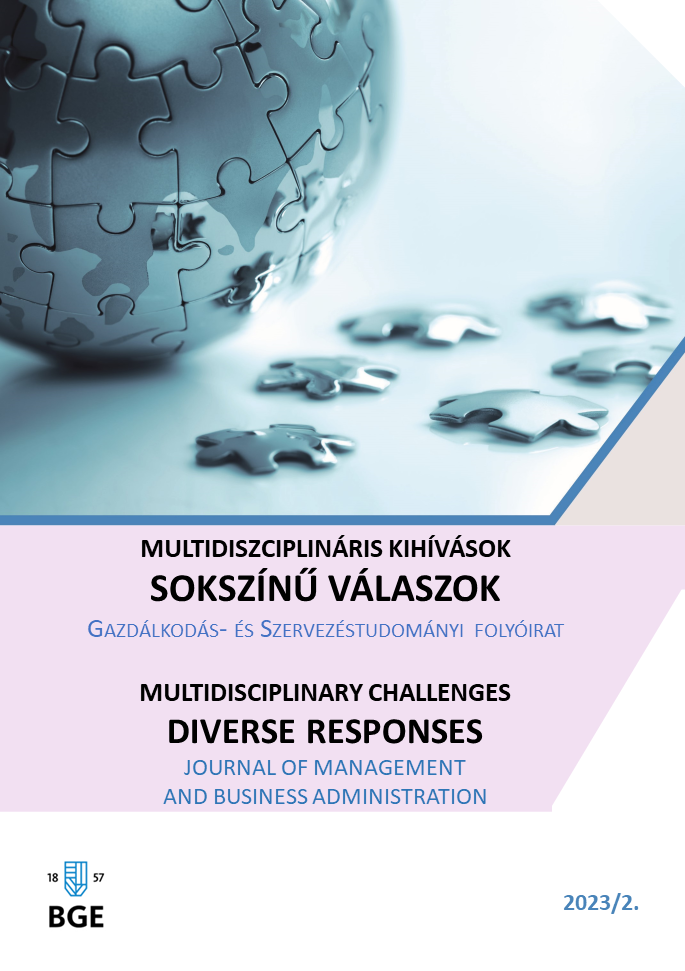The Role of the Human Factor in the Quality Management of Hunting Tourism Services
Abstract
"Hunting" is now a strong tourism motive and the role of "hunting tourism" in shaping the image of a country and destination has become clear. According to the National Hungarian Hunting Chamber, 29 506 foreign hunting guests visited Hungary in the 2021/2022 hunting year, and the sector closed the last hunting year with a balance of HUF 3780 million (+11.48%). According to Robinson & Novelli (2005), hunting tourism can also be considered as a "niche" tourism, a form of tourism in an authentic environment, motivated by a special interest, and therefore only a narrow group of consumers.
In the case of 'hunting tourism', the customer experience is created through a process of co-creation of a shared experience through interaction, often personalised, between the customer and the service provider. The service provider facilitates the experience by creating the right experiential environment, starting from the provision of game as a limiting factor of production, and then acting as an assistant throughout the service process, so that the quality of the interaction between them has a major impact on both the success of the hunting experience and its experiential nature. This form of effective 'cooperation' between the hunter and the client presupposes and requires a much stronger relationship of trust than is the case in other types of tourism (e.g., certain types of mass tourism).
Based on focus group studies and case studies the aim of this study is to explore, the role of the 'human factor' involved in the delivery of hunting tourism services in shaping customer perceptions and service quality, and to identify the character traits that are fundamental and cardinal to customer satisfaction and return intentions. The results of the studies report that for customers using hunting tourism services, the service provider who is involved in the experience process and who comes into contact with them, as a "human factor", clearly plays a decisive and specific role in the development of the service experience and customer satisfaction. This decisive role manifests itself through the identified character traits, which also have a direct impact on certain attributes of hunting tourism products.
References
Becser, N., 2008. Szolgáltatásminőség modellek. Corvinus Egyetem, Vállalatgazdaságtani Intézet, 89. sz. Műhelytanulmány.
Bányai, E., 1995. Minőség és fogyasztói elégedettség a szolgáltatásmarketingben. Marketing és Menedzsment. 3. 65-70.
Higginbottom, K., 2004. Wildlife tourism: impacts, management and planning. Common Ground Publishing Pty Ltd. Australia.
Kandampully, J., 2006. The New Customer-Centred Business Model for the Hospitality Industry. International Journal of Contemporary Hospitality Management, Ohio, USA, 18(3). https://doi.org/10.1108/09596110610658599
Karakasné, Morvay, K. & Daruka, E., 2009. Az elvárások szerepe a szállodai vendégelégedettségben. Turizmus Bulletin 12(2), 48-57.
Magda S. & Marselek S., 2010. Vidékgazdaságtan I., A vidékfejlesztés gazdasága. Gyöngyös, Főiskolai jegyzet.
Magyar, Z., 2009. Termékstratégia prioritások vizsgálata az Észak-alföldi régió kisvállalkozásainak körében. Agrártudományi Közlemények, 2009/33, 55.-64.
Magyar Z. 2020 A vadászati turizmus és az országimázs kapcsolata. Turisztikai és Vidékfejlesztési Tanulmányok, 2020. 5(4), 29-43.
Magyar, Z., 2022. Vadászati turizmus, Szaktudás Kiadó
Michalkó, G., 2016. Turizmológia. Akadémia Kiadó.
Mitev A., 2015. A kvalitatív kutatás filozófiája és a kvalitatív kutatási terv. In: Horváth & Mitev, 2015. Alternatív kvalitatív kutatási kézikönyv. Alinea Kiadó, Budapest.
Nagy, K., 2017. A kvalitatív kutatás lehetőségei a turizmusban. In.: Tanulmányok a Marketing és Turizmus Intézet kutatási eredményeiből. Miskolci Egyetem, Marketing és Turizmus Intézet Marketingkaleidoszkóp
ova.hu, 2022. Országos Vadgazdálkodási Adattár, Elérhető: http://www.ova.info.hu/vg_stat/VA-2021-2022.pdf
Parasuraman, A., Zeithaml, V. A. & Berry, L. L., 1985. A Conceptual Model of Service Quality and Its Implications for Future Research. Journal of Marketing, 49(3), 41-50. https://doi.org/10.2307/1251430
Robinson, M. & Novelli, M., 2005. Niche Tourism: An Introduction. In: M. Novelli (ed.) Niche Tourism: Contemporary Issues, Trends and Cases. Oxford: ButterworthHeinemann Ltd.
Somlai, R., 2021. Az emberi erőforrás, mint versenyképességet növelő tényező szerepe a turizmus szektorban [Doktori disszertáció] Magyar Agrár és Élettudományi Egyetem, Gazdaság és Regionális Tudományok Doktori Iskola. Elérhető: https://uni-mate.hu/documents/20123/336900/Somlai_Reka_ertekezes.pdf
Seilmeier, G., 1997. Vadászati lexikon. Méliusz, Debrecen.
Trauer, B. (2006): Conceptualizing special interest tourism – framework for analysis. Tourism Management, 27(2), 183-200. http://dx.doi.org/10.1016/j.tourman.2004.10.004
Zátori, A., 2014. Élményszemlélet a turizmusban A turisztikai élményteremtés koncepciói. Turizmus Bulletin. 14(2), 51-60.


























